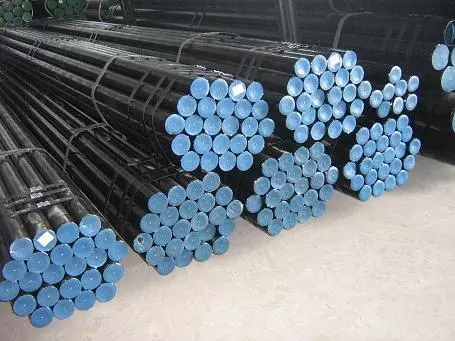Generally, the hardness of seamless steel pipes has three standards: Brinell Hardness, Rockwell Hardness and Vickers Hardness.
1. Brinell Hardness
Brinell Hardness is the most common standard for seamless steel pipes, generally use diameter of indentation to represent the hardness of material, which is intuitive and simple. However, the standard is not suitable for hard and thin steel pipes.
2.Rockwell Hardness
Rockwell Hardness is also use indentation to represent the hardness, but Rockwell measures its depth rather than diameter. Rockwell Hardness is widely applied in testing hardness of seamless steel pipes, the standard HRC is the most popular testing method next to Brinell Hardness (HB). Rockwell Hardness can be used to test both extremely soft and hard material which supplements shortcomings of Brinell Hardness. The number of hardness can be read directly from the dial. However, due to slighter indentation, Rockwell Hardness is less accurate than Brinell Hardness.
3. Vickers Hardness
Vickers Hardness is also depending on testing indentation which can be applied to test thin metal material. Vickers Hardness combines advantages of Brinell and Rockwell, but the measurement is not as convenient as Rockwell, therefore is not widely used as the hardness standard.
Hardness Testing Methods
Mechanical properties of stainless steel should be taken into consideration when testing its hardness which related to the quality and performance after deformation, stamping, cutting and other processing. Thus, all seamless steel pipes need mechanical property test, the test has two types: tensile test and hardness test.
Tensile test is use a seamless steel pipe sample, and then pull the sample on the machine till it’s broken, therefore can test its tensile strength, yield strength, and elongation. The tensile test is the most common method to test the mechanical property of metal material. As long as the mechanical property is required, all metal material need to have tensile test. Particularly for those metal materials have complicated shapes that are not easy to be tested, the tensile test is the only way to test its mechanical property.
Hardness test is use a indenter and pressed it into the surface of sample pipes slowly, then measure the depth or dimension of the indentation so that can get the hardness. The hardness test is the simplest and the most convenient method to test the mechanical property of certain material. The hardness test is non-destructive, and has similar values in terms of the relationship between hardness and tensile strength. The hardness of material can be converted into tensile strength values which have great practical significance.
Since the tensile test is not easy to undertake, and it’s convenient to converted hardness to strength, therefore, more and more manufactures choose to test hardness of material rather than its strength. As the development of manufacturing technique and testing technology, materials such as seamless steel pipes and stainless steel pipes which cannot test hardness directly in the past, now can test directly. Thus, the hardness test will gradually replace the tensile test.


